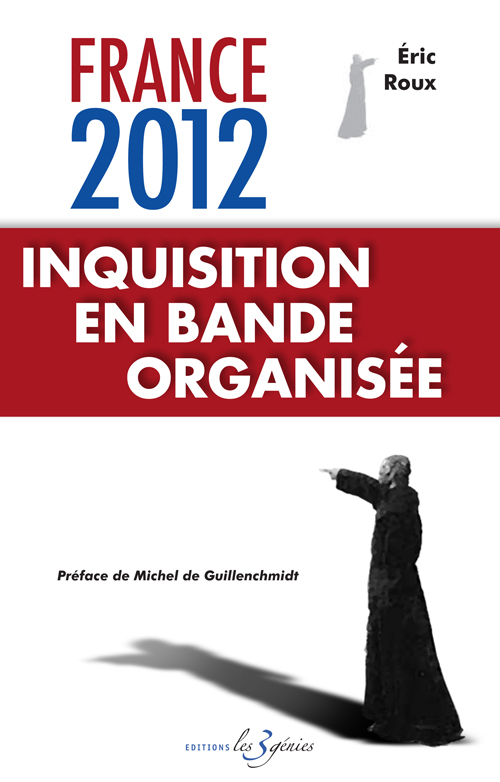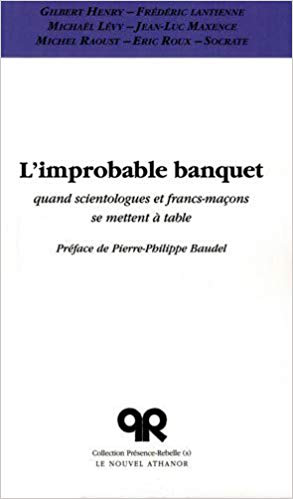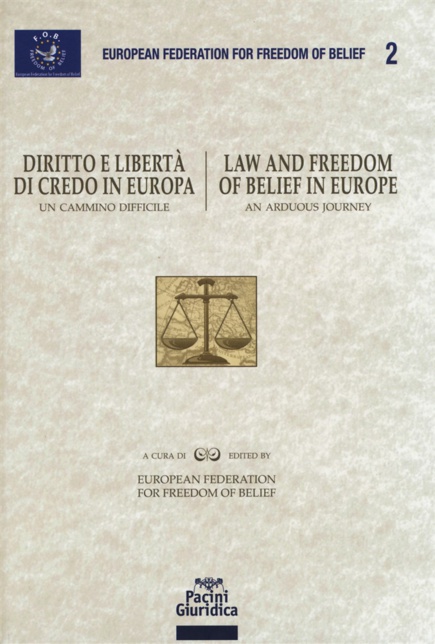Blog personnel - News - Religion - Scientology - Droits de l'Homme - Interviews - Livres - etc.
Le blog
Eric Roux

Ministre du culte de L'Eglise de Scientology, après 30 années passées dans le clergé de l'Eglise, Eric Roux est aujourd'hui le président de l'Union des Eglises de Scientology de France et Vice Président du Bureau Européen de L'Eglise de Scientology pour les affaires publiques et les droits de l'homme. Il est aussi Président élu du Conseil International de URI (United Religions Initiative) et le Président du European Interreligious Forum for Religious Freedom.
Ce blog est une initiative personnelle destinée aux gens qui s'intéressent à la spiritualité, ou à ceux qui souhaitent en apprendre plus sur la scientology, à ceux qui pensent que la liberté de conscience est un droit fondamental qui mérite d'être défendu, à mes coreligionnaires ou encore à ceux qui sont curieux...
Ce blog est une initiative personnelle destinée aux gens qui s'intéressent à la spiritualité, ou à ceux qui souhaitent en apprendre plus sur la scientology, à ceux qui pensent que la liberté de conscience est un droit fondamental qui mérite d'être défendu, à mes coreligionnaires ou encore à ceux qui sont curieux...
Galerie (cliquez dessus pour plus d'images)
Rubriques
Dernières notes
Archives
Sites de Scientologie
Association paraînées par l'Eglise de Scientologie
Liberté de Conscience
Le livre "Law and Freedom of belief in Europe, an Arduous Journey", ou "Diritto e Libertà di Credo in Europa, un Camino Difficile ", vient de paraître aux éditions Pacini Giuridica. Il s'agit d'un ouvrage dans lequel tous les articles sont en deux langues, anglais et italien, qui retrace les interventions de nombreuses personnalités lors de la convention éponyme qui s'était tenue à Florence en janvier dernier, sous les auspices du Secrétaire Général du Conseil de l'Europe, sous le haut patronage de l'Assemblée Parlementaire de l'OSCE et du Président de la République Italienne. C'est donc tout naturellement qu'on y trouvera à la page 492 la retranscription de mon intervention.
Pour ceux qui parlent anglais, voici le texte de mon intervention tel qu'on le trouve dans ce livre :
Eric Roux
19 janvier 2018 - Florence, Italie
I am going to start by explaining what is, I think, my only legitimacy here: I am not a scholar, I'm not a lawyer, I'm worst: I'm an activist. So my legitimacy is to be active and having had, in the past, some results in the field of religious freedom.
From that point of view, I have bad news for lawyers. I am pretty sure that you all know the bad news, but I will repeat it: the law is not enough. Why? Because we have, at least in Europe, a lot of good laws that protect religious freedom. And many constitutional provisions that guarantee religious freedom. But we still have a lot of issues on religious freedom.
Of course, law, in theory, could be a science. Practically, in the real world, it's more a martial art. Any lawyer knows that it's a martial art. Judges are human justice, not divine justice. And human justice has this small peculiarity which is that it lacks, sometimes, humanity. In addition, some judges are good judges, some judges are bad judges.
So you have, with the same law, very different effects. With the same law you will have some judgments which will be very positive for religious freedom, and some which will be very negative for religious freedom, because there is discrimination that comes from prejudice. And judges are human, and subject to prejudice.
At the same time, even when you have good judgments, the question of the implementation of these decisions is crucial. Let's speak about, for example, the UN Committee on Human Rights. In the United Nations you have a committee which is charged with rendering decisions concerning violations of the International Covenant on Civil and Political Rights. It can render very good decisions. One of them, three of them actually, concerned the Sikhs in France. You know that in France there is a law from 2004 that forbids religious symbols at school. For the Sikhs it's a problem because the Sikh children need to wear a turban. So they are kicked out from schools because they don't want to take off their turban. And the committee of Human Rights, of the UN, rendered a decision on this issue of the turban in a specific case, asking France to change the law.
This Covenant has been signed and ratified by France, but the doctrine also says that the decisions of the Committee are not really binding. Of course, if you say to a State, “you know we render a decision but it's not really binding”, you can be sure that the State will not do anything with it. In that case the consequence is that the 2004 law is still exactly the same and the Sikhs still have the same problem.
Pour ceux qui parlent anglais, voici le texte de mon intervention tel qu'on le trouve dans ce livre :
Eric Roux
19 janvier 2018 - Florence, Italie
I am going to start by explaining what is, I think, my only legitimacy here: I am not a scholar, I'm not a lawyer, I'm worst: I'm an activist. So my legitimacy is to be active and having had, in the past, some results in the field of religious freedom.
From that point of view, I have bad news for lawyers. I am pretty sure that you all know the bad news, but I will repeat it: the law is not enough. Why? Because we have, at least in Europe, a lot of good laws that protect religious freedom. And many constitutional provisions that guarantee religious freedom. But we still have a lot of issues on religious freedom.
Of course, law, in theory, could be a science. Practically, in the real world, it's more a martial art. Any lawyer knows that it's a martial art. Judges are human justice, not divine justice. And human justice has this small peculiarity which is that it lacks, sometimes, humanity. In addition, some judges are good judges, some judges are bad judges.
So you have, with the same law, very different effects. With the same law you will have some judgments which will be very positive for religious freedom, and some which will be very negative for religious freedom, because there is discrimination that comes from prejudice. And judges are human, and subject to prejudice.
At the same time, even when you have good judgments, the question of the implementation of these decisions is crucial. Let's speak about, for example, the UN Committee on Human Rights. In the United Nations you have a committee which is charged with rendering decisions concerning violations of the International Covenant on Civil and Political Rights. It can render very good decisions. One of them, three of them actually, concerned the Sikhs in France. You know that in France there is a law from 2004 that forbids religious symbols at school. For the Sikhs it's a problem because the Sikh children need to wear a turban. So they are kicked out from schools because they don't want to take off their turban. And the committee of Human Rights, of the UN, rendered a decision on this issue of the turban in a specific case, asking France to change the law.
This Covenant has been signed and ratified by France, but the doctrine also says that the decisions of the Committee are not really binding. Of course, if you say to a State, “you know we render a decision but it's not really binding”, you can be sure that the State will not do anything with it. In that case the consequence is that the 2004 law is still exactly the same and the Sikhs still have the same problem.
Eric Roux





Liberté de conscience
Commentaires (0) | Permalien